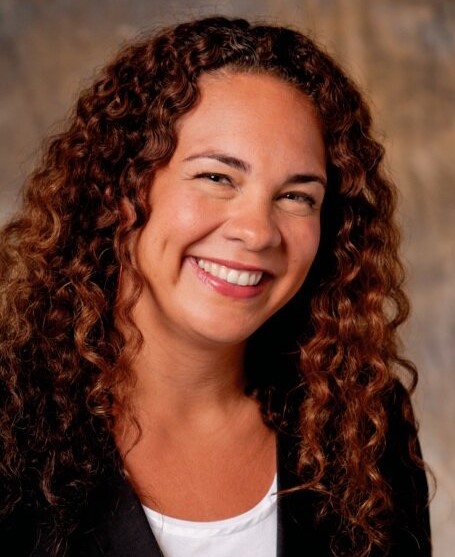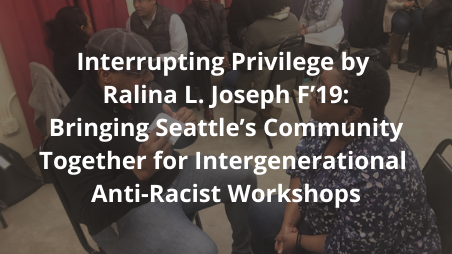

Having intra-racial race dialogues or Black community dialogues in a predominantly white city during a time of racial upheaval can feel like balm…coming together to just talk provides us with moments of healing together.

Through Interrupting Privilege, an anti-racist seminar founded and led by 2019 Mellon/ACLS Scholars and Society Fellow Ralina L. Joseph, community members gathered at the Northwest African American Museum (NAAM) in Seattlefor intergenerational skills-building workshops to combat racism.
In one of Interrupting Privilege’s recorded dialogues, a participant in a workshop on intraracial uses of the “N” word tells her grandson, “I think your comfort level goes back to what your journey has been. And my respect for what other people are comfortable with comes from the fact that I haven’t walked in your shoes.”
This is just one of many conversations that resonated with Ralina L. Joseph F’19, Professor of Communication and adjunct Professor of American Ethnic Studies and Gender, Women, and Sexuality Studies at the University of Washington. During the fellowship year, and in partnership with the Northwest African American Museum, Professor Joseph organized events in which members of the community across generational lines came together for discussion, critique, and radical listening – a practice she considers central to anti-racist dialogue. Equal parts research project and workshop, Interrupting Privilege creates spaces for dialogue and avenues for people to grapple with and heal from racism in our society.
“People aren’t coming together to engage in thoughtful, intergenerational racial dialoguing. It’s what we need the most right now – and it’s what [Interrupting Privilege] provides,” Joseph says.
Initially, Joseph launched Interrupting Privilege at the University of Washington in the wake of the Trump election in 2016. She saw a need to create a space for people to grapple with structural inequality and racism and work together to “interrupt privilege within our spheres of influence.”
“[I] found that our communities were experiencing trauma around race, but that they didn’t have places to process that racial trauma.”
In 2019, Joseph was awarded the Mellon/ACLS Scholars and Society Fellowship to continue her work with Interrupting Privilege and partner with the Northwest African American Museum (NAAM) in Seattle Washington’s Central District, a historically Black neighborhood.
This year-long fellowship program provides opportunities for faculty who teach the humanities and social sciences at PhD granting institutions to engage in timely societal questions: addressing issues such as racism, climate change, economic inequality, and more. Fellows pursue publicly engaged research projects while in partnership with a cultural, media, government, policy, or community organization.
Shifting from the University of Washington to NAAM allowed Interrupting Privilege to recenter the perspectives and experiences of Black Americans in the community, as well as to connect people of varied backgrounds (e.g. with regard to age, gender, profession, class, etc.) who would generally not engage with one another. When the pandemic hit in Spring 2020, closing NAAM to visitors, Joseph worked with the museum to produce virtual sessions in place of in-person meetings.


Having intra-racial race dialogues or Black community dialogues in a predominantly white city during a time of racial upheaval can feel like balm…coming together to just talk provides us with moments of healing together.
“[Interrupting Privilege] grew so much more from our partnership with NAAM,” she mentions. “While the project has always had community member partners, being physically located in the community and not at the university substantively changed the tone and tenor of our program. Because the fellowship didn’t place limitations on me, I was able to expand it far beyond what I thought was possible, and to create a far more impactful program to match a community need.”
During workshops, participants gain skills in radical listening, sitting with discomfort, and interrupting microaggressions. “Participants left with the validation that they weren’t alone in their experiences or in some cases that they weren’t ’imagining‘ their everyday experiences of racism,” Joseph notes.
Although the fellowship had ended, this summer, the group virtually reunited again to comfort one another and sit in each other’s pain and emotion after the murder of George Floyd and the subsequent national protests. “Having intra-racial race dialogues or Black community dialogues in a predominantly white city during a time of racial upheaval can feel like balm,” Joseph said.
“We are all walking around with these gaping wounds barely covered with band aids; coming together to just talk provides us with moments of healing together.”
The events of this summer motivated Joseph to create an online podcasting class where community members constructed audio recordings of their conversations including discussions on microaggressions, tokenism, racial slurs, and more.
This fall, Joseph will continue Interrupting Privilege by focusing on how the Black community can support one another during COVID and racial exhaustion.
Joseph offers this advice to incoming Mellon/ACLS Scholars and Society fellows: Use the year-long fellowship to dream and imagine all the possibilities that come with this opportunity for public scholarship and engagement.
Learn more about current and recent Mellon/ACLS Scholars and Society Fellows and their work in communities across the United States.